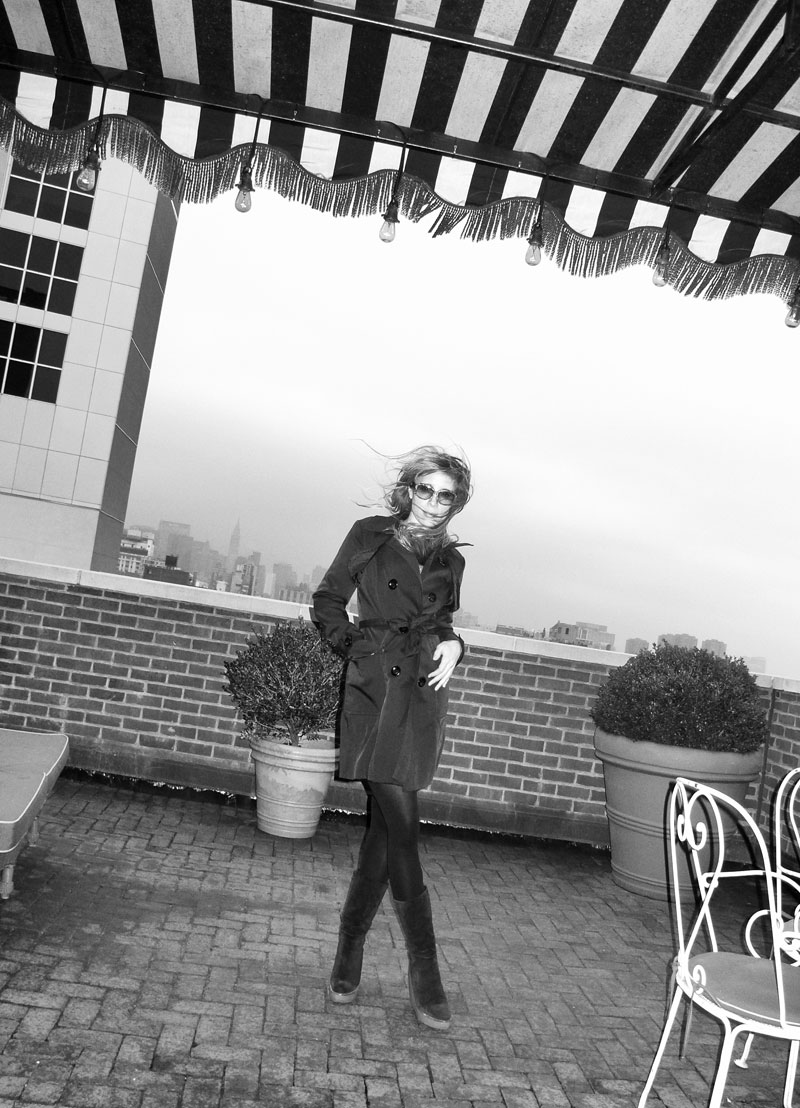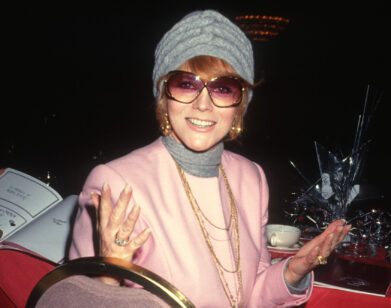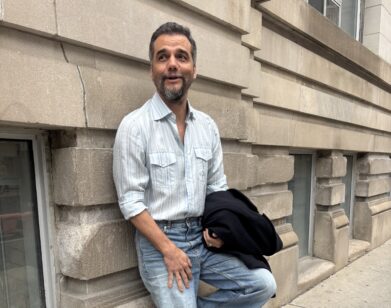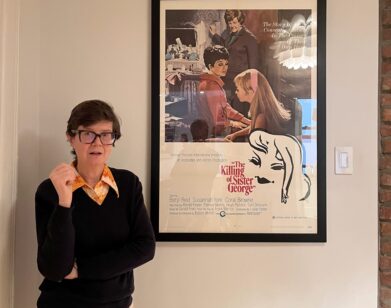Jen Gatien Dives Into the Limelight (Again)

PHOTOS BY JENNIFER ROBBINS
“As a child, I didn’t go to Limelight other than in the day. Drew Barrymore went. I remember being really jealous because we’re the same age, and asking, ‘Why does she get to go?'” Jen Gatien, film producer and daughter of legendary former New York nightclub owner Peter Gatien, met with Interview at The Smile on Bond Street to talk about her upcoming projects—which include Bradley Rust Gray’s highly anticipated Jack and Diane, starring Jena Malone, Riley Keough, and Juno Temple, and the documentary Limelight, premiering at this year’s Tribeca Film Festival. Sharing with us some of her memories from the real Limelight club—a Gothic 19th Century Episcopal church whose labyrinthine hallways her father transformed into the city’s most popular club in the late ’80s and ’90s—Gatien’s deep appreciation for storytelling is palpable.
DURGA CHEW-BOSE: Where did you get your start?
JEN GATIEN: I P.A.’d on A Bronx Tale when I was in college. I went to Columbia for film—well, film and anthropology—thinking I would strictly work in documentary, and then I floundered for a while, not knowing what I’d be doing, and then I fell in love with the script Hounddog, that had come to me through a friend. I sunk my teeth into it and got my producer chops.
CHEW-BOSE: How involved were you in dealing with the controversy surrounding Hounddog?
GATIEN: I was involved in it in the sense that it came throttling at us, but it was never intended that way, and I know people go, “What did you expect?” You know, it’s Dakota Fanning getting sexually assaulted in the film, but it never occurred to me, and I know it never occurred to the director, that it was going to spark this sort of venom that was like picketers and Sundance and the Catholic League guy, whatever his name is, [Bill] Donohue, who has since gone on to bash several other films. He’s someone who makes a campaign, gets his name in boldface, gets to go on CNN, and I’d never even heard of the guy but he was given a great soapbox, so he ran with it.
CHEW-BOSE: Yeah, I bet. So Hounddog was your first feature and Chelsea on the Rocks was your first doc?
GATIEN: Yeeeah, yes.
CHEW-BOSE: You’re smiling…
GATIEN: I’m smiling because it’s an Abel Ferrara conversation, which brings back fond memories.
CHEW-BOSE: You used to live there, right, at the Chelsea Hotel?
GATIEN: I lived there, Abel lived there, there was no escaping that film, there was no escaping the director. He couldn’t escape me; it was like a perfect marriage!
CHEW-BOSE: Did Abel persuade you to get involved with the project?
GATIEN: Abel was someone that I always admired, and I remember seeing him shoot Bad Lieutenant at Limelight, and he was like this super-forceful guy that I was always in awe of. So I knew I wanted to do a documentary about the Chelsea, which kind of answers your earlier question that there’s no one way a film happens. This film happened because I knew I wanted to do it, Abel was in New York, and I asked him to be an interviewee in the film.
CHEW-BOSE: So you were going to interview him and…
GATIEN: Yes, and he was like, “No, actually I’m going to take over this film.” But it was like a huge blessing, because I didn’t think he would even consider a small-budget documentary about the Chelsea Hotel. He’s Abel Ferrara! To me, he’s super-iconic! Abel is just one of those figures that has just weaved in and out of my life. I remember seeing him at the Tunnel, and he was talking to Leonardo DiCaprio at the time about doing the sequel to King of New York, and he just seemed like he was out of my league. And then we started talking, and he started directing Chelsea on the Rocks, and we’re still really good friends. I love him.
CHEW-BOSE: Exactly how many movies do you have coming out in 2011? Four? Or is it five?
GATIEN: Five. Limelight, For Ellen, Evolution of a Criminal, The Girl’s in Trouble, Jack and Diane.
CHEW-BOSE: That’s a lot of titles! Crazy.
GATIEN: It’s crazy but it’s also not crazy. That’s the weird part. For me, last year was crazy because I worked back to back. I had no life. I literally went from project to project, worked six sometimes seven days a week. I don’t know if it’s postpartum depression, or what, because it’s sort of this holding pattern until these films are launched. It’s critical that they get sent out into the world in a way that I’ve been planning for years; especially with the Limelight film. I mean, I don’t want to sound all doom and gloom, but this year is going to be very telling.
CHEW-BOSE: No pressure!
GATIEN: [laughs] No pressure at all!
CHEW-BOSE: So let’s talk about your film, Limelight. In my email last week to you I had mentioned that I was reading Frank Owen’s Clubland, and I’m not sure if it’s an account you agree with or disagree with…
GATIEN: I actually have mixed feelings about Clubland.
CHEW-BOSE: Yeah, I bet. There were two books that I tried to find when I wanted to learn more about Palladium, and the Tunnel, and Limelight, but I could only find Clubland at the Strand. I can’t remember the title of the other one.
GATIEN: I’m so curious which one that was. I think I know which one it is, but I’m not even going to say the title of the book because the person who wrote it is the biggest loser alive.
CHEW-BOSE: Good thing I didn’t find it, then! I can leave that out if you want.
GATIEN: [laughs] You can keep that on the record!
CHEW-BOSE: I had seen Party Monster years ago, and that’s pretty much all I knew for some time about that scene and time in New York. But in reading the book, I learned a lot more about your father and his sense of enterprise.
GATIEN: Yeah, yeah. Like owning, controlling, representing… It was a crazy, crazy era, and I grew up in that, and I also grew up while it was coming to a screeching halt. You know, I had to find my footing in this world without my dad here.
CHEW-BOSE: So when did you decide you wanted to make a doc about it? Is Limelight just about that one club, or…
GATIEN: It’s a bigger portrait of New York in a pre- and post-Giuliani New York. And it looks at the era and uses sort of Peter Gatien’s story as a metaphor for that change in New York. So it’s got a macro- and micro-element to it. Which is essentially a device the director used, not me. The director, Billy Corben, had done the same thing with Cocaine Cowboys, where the larger landscape was about Miami being built on a cocaine culture, and the more micro story was this one drug smuggler. So we used that tool of representing New York in that era and all the change that was going on, for better or for worse, and really leaving it up to the viewer to decide if the city is better or worse off.
CHEW-BOSE: What do you think?
GATIEN: I think Giuliani’s intentions for this city at first were kind of a welcome thing, and I understand where he was heading, but it ultimately went to a place that just gentrified this city. I don’t know if it’ll ever bounce back in terms of being the artistic center that it once was. New York’s just shifted. iuliani represents to me a person who has a vendetta, and fixations with things. He is a pit bull who won’t let go until he ruins a person. And he’s done it to other people in this city, arresting people publicly with no basis other than to humiliate them. He’s a bully.
Nightlife used to be so integral to culture, fashion, art. It was used to be really defining for artists; a meeting place and centerpiece for your life in New York in the ’90s. Now, are you joking? I don’t even know where to go. It was all so defining, you know? There was a certain period of time when Limelight, Tunnel, Palladium, and Club USA, were all four running simultaneously. And each place held between three and six thousand people. And if you just do those numbers in your head, a staggering amount of people went through those clubs on the weekend and had their own experience there. There were no cameras, nothing.
CHEW-BOSE: And now Palladium’s an NYU dorm…
GATIEN: And Limelight’s a mall!
CHEW-BOSE: So when did you start working on this doc?
GATIEN: Limelight was initially going to be a feature film, and there was an option in 1999 for this story from Akiva Goldsman. So for me, this has been a twelve-year thing. Because the story almost is inconceivable as a true story, I’m happy it’s instead coming out as a documentary. There are so many twists and turns that people don’t know about—certainly the books and the press haven’t covered—that I feel like this film will unveil. And the characters that were part of that scene would be hard to cast with actors in many ways.
CHEW-BOSE: Your dad was played by Dylan McDermott in Party Monster…
GATIEN: Yeah, no comment. He just slapped on an eye patch and said things in monotone. That was character development, I guess? [laughs] But yeah, getting back to the doc, I mean it’s such a touchy subject for some people. [Limelight] was open for seventeen years with my father running it. That’s a lot of people, and certainly generationally, there’s a lot of people that it hit. So yeah, the project sat around for a while and then I partnered up with this guy, Dave Berlin, another producer, who was my partner also with Holy Rollers—so there is an ecstasy theme going on here! And he and I decided to make the Limelight film, and it’s been a great experience.
CHEW-BOSE: And are you in it?
GATIEN: No, it’s funny. It’s less a love letter to Limelight and more a look at the criminal charges, accusations, and abusive power of federal government. So it’s less a montage of different nightclub-goers; it’s a big picture on the war on drugs and forfeiture laws with the war on drugs, and the lengths to which the government will go to get somebody. The director was very adamant [that I] stay away from the editing room. We strung all the interview subjects together, gave reassurance that this wasn’t going to be an exploitative film. But the film takes a really hard look at the people and that time; who was up to no good; it’s going to blow some people’s minds as to what went on.
CHEW-BOSE: I’m sure you have a lot of memories of the clubs, any ones that really stand out?
GATIEN: I remember it distinctly. You know, first coming to New York in 1983, we were living in Tribeca, and Tribeca was no man’s land then. I was literally roller-skating down there, and there was nothing, nothing down there. And he had bought the church, and I remember playing hide-and-seek in there, in the empty shell of the building. So I saw it get created.
CHEW-BOSE: Okay, so what about your other movies coming out—For Ellen? That’s starring Jena Malone and Paul Dano…
GATIEN: And John Heder and Margarita Levieva, and Dakota Johnson. It’s a beautiful film. So Yong Kim is an incredible filmmaker, she wrote and directed it. We shot in Messina, New York. As in ten minutes from Cornwall, Ontario. It was very personal in that for me, I was going back to that part of the planet that I’m from, and you know, bringing a film there, and taking advantage of my connection to that place. My cousin is the head of the police department there, and so it was kind of wild to go back to that town. It was very full circle. And Jena Malone is also in Jack and Diane. So Yong Kim’s husband is Bradley Rust Gray, the director of Jack and Diane.
CHEW-BOSE: So is that how you pick your projects? Considering the independent filmmaking climate, do scripts come to you? Do you have writers, directors in mind?
GATIEN: I look at a project’s artistic merit but also, if it’s commercially viable. Generally I work with writers and directors, so it’s like, what is it about them that I want to attach myself to? And the casting process is often really how films get financed. The filmmaker can have all this vision, but it’s like right now, unless you have some bona fide known actors, it’s really that much harder to get financing, and vice versa. There’s a catch-22 to it.
CHEW-BOSE: Well so far, it seems like everything you’ve worked on has reached theaters and an audience.
GATIEN: Yeah, God. Thank you. I never look at things that way. I usually just look at everything that needs to get done. Perseverance is one of my traits that for some people is annoying and that for other things it’s served me well. It can be definitely harrowing at times…
CHEW-BOSE: So what gets you through it?
GATIEN: I guess there have been obstacles that have come at me in life… Listen, if you can overcome an indictment by the federal government, to me, making a movie has got to be child’s play! [laughs] That’s how I kind of approach it!
CHEW-BOSE: That’s a great way of looking at it. And it’s amazing that that’s what you have as yardstick, of all things, for measuring what you can achieve.
GATIEN: That’s so true! That’s my bar—two-and-a-half years of the most harrowing, nightmarish, Kafka-like experiences. So when things get hard on a film set, I generally don’t lose my cool, because it all seems not as significant as when your life is threatened in a really crazy way.






